Why Online Learning Won’t Make You a Professional Tattoo Artist
The tattoo artist profession is becoming increasingly popular, prompting many aspiring artists to seek quick and easy ways to obtain a diploma.
Alongside this trend, the popularity of online tattoo courses has surged, offering broader access to the field but also creating significant challenges. The main issue lies in the lack of quality education, as technical skills and workplace safety are difficult to master without hands-on mentorship.
Online learning can never replace real-world practice, where aspiring artists hone their skills under the guidance of experienced professionals. Moreover, such courses often diminish the prestige of the profession, fostering the misconception that it can be mastered quickly and without genuine effort.
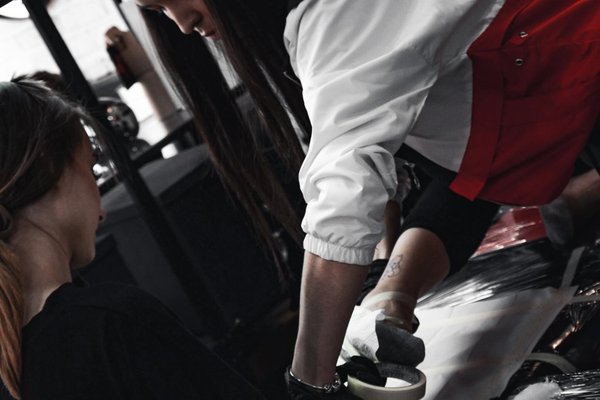
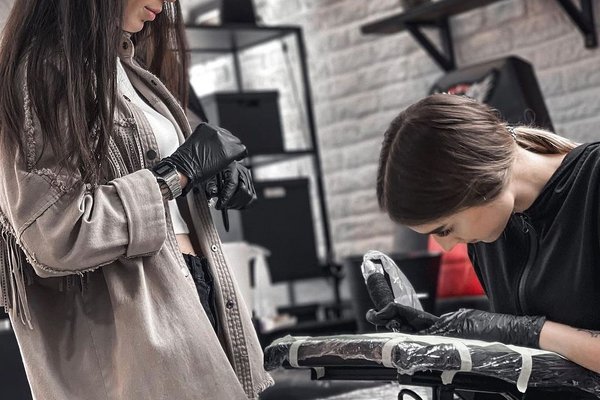
The Main Disadvantages of Online Tattoo Training
Online tattoo training appeals to many due to its flexibility and convenience, allowing students to learn from home.
The low cost of such courses is an advantage, but the course price is not the final expense for future tattoo artists. It’s important to understand that the disadvantages of online training far outweigh the benefits.
- The Illusion of Ease and Speed in Mastering the Tattoo Artist Profession
- Marketers promise that in just a few weeks—or even days—you can become a professional tattoo artist, ignoring the importance of long-term practical experience under mentor supervision. Advertising materials often embellish results, creating the false impression that the basic knowledge and techniques learned online are enough. This misleads beginners, as the reality of the profession requires significantly more preparation and responsibility.
- Lack of Practice with Real Clients
- Even practicing on artificial skin does not provide a full understanding of how the needle works on living tissue. Only practice on real models helps to learn the properties of real skin, its resistance, and how pigment reacts. It’s essential to understand the specifics of skin, its sensitivity, and to consider this during the work.
- Inability to Grasp Client Psychology Without Live Interaction
- Clients come to a tattoo artist not only for a tattoo but also for the emotional experience. People are different: some are nervous before their first tattoo, others fear the pain, and some are unsure about their final design choice. Online courses cannot teach you how to properly communicate with clients, understand their needs, and create a trusting atmosphere. These skills are gained only through live interactions in a studio, where the artist learns to listen and respond to clients’ requests, fears, or doubts.
- Difficulty Mastering Technique Without a Live Example
- The best tattoo artists become professionals thanks to mentorship. Mentors share their experience, point out mistakes, and help correct them. In a studio, a mentor will demonstrate how to properly hold the tattoo machine, draw even lines, avoid excessive pressure, and answer any questions.
- Lack of Knowledge and Compliance With Sanitation Standards
- Tattoo artistry is not just about creativity but also about responsibility for the client’s health. Tattooing is an invasive procedure requiring strict adherence to sanitation standards. An online course can provide an overview of sterilizing tools, preparing the workspace, and preventing infections, but it cannot show how to apply this knowledge in practice. In real life, meticulous attention to every detail is essential, as even minor mistakes can lead to serious consequences.
According to statistics, less than 1% of students who complete online training end up working in the tattoo industry. In comparison, after completing a year of practice at VEAN TATTOO Academy, 39% of graduates become professional tattoo artists.
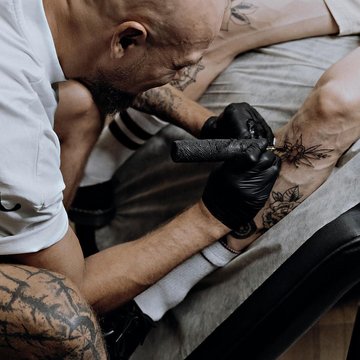
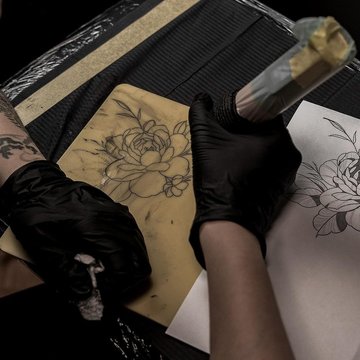
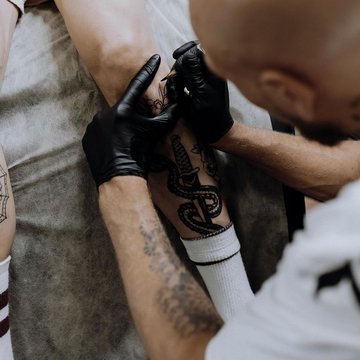
Risks for Tattoo Artists with Insufficient Practical Training
The inability to apply theoretical knowledge in practice poses a serious threat to both the artist and the client.
Proper training, hands-on experience, and continuous skill development are crucial for ensuring safety and professionalism.
Medical Risks
- Infectious Diseases: Both the client and the artist are at risk. Non-sterile tools or failure to follow hygiene standards can lead to infections with dangerous diseases such as hepatitis B and C, HIV, or bacterial complications.
- Allergic Reactions: Inexperienced artists may fail to warn clients about the risk of allergic reactions to ink or materials, potentially resulting in itching, rashes, or even anaphylactic shock. Poor communication increases the likelihood of severe complications.
- Damage to Skin Lesions: Tattooing over moles, hemangiomas, papillomas, warts, or similar formations may trigger their transformation into malignant tumors (melanomas).
- Health Deterioration from Hazardous Materials: Artists unfamiliar with proper handling of pigments risk exposing themselves to allergic reactions or toxic effects.
- Scarring and Skin Deformation: Incorrect needle depth or careless technique can leave scars, keloids, or damage to the skin, potentially requiring medical intervention.
- Chronic Skin Conditions: Poorly executed tattoos can act as triggers for conditions such as psoriasis or dermatitis.
- Infection from Lack of Aftercare Guidance: Inexperienced artists may fail to provide clients with proper post-procedure care instructions, increasing the risk of inflammation and infection.
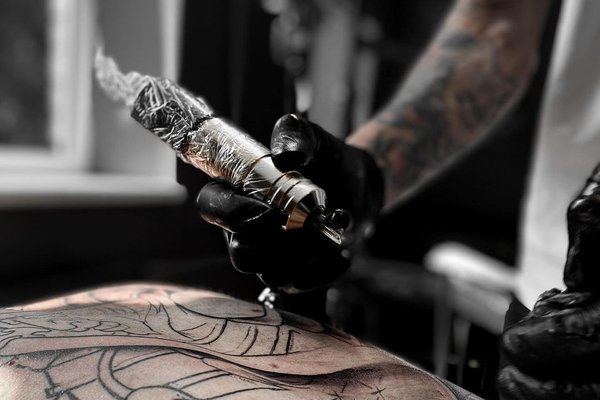
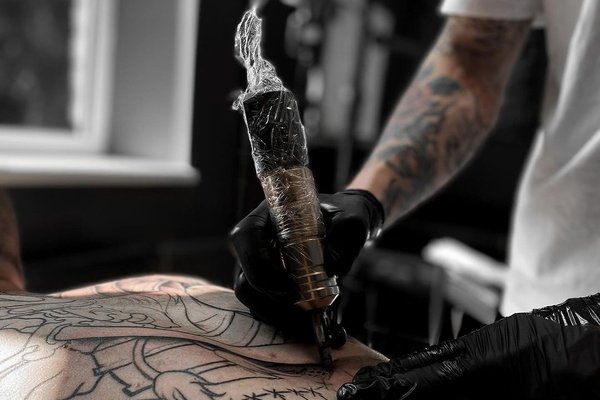
Legal Risks for Tattoo Artists
- Lawsuits for Damages. Unsuccessful tattoos or medical complications can lead to lawsuits for harm caused to the client’s health or breaches of contractual obligations.
- Operating Without a License. In countries with strict regulations, tattoo artists without proper authorization may face fines or even lose the right to practice.
- Lack of Documentation. Failure to maintain proper records, such as client consent forms or medical questionnaires, makes it challenging to defend against legal claims.
- Disputes Due to Misunderstandings. Inability to clearly discuss tattoo details (such as size, colors, or style) may result in client complaints, demands for refunds, or legal actions.
- Violations of Sanitary Regulations. Non-compliance with hygiene standards or improper equipment handling can trigger inspections and fines from regulatory authorities.
- Copyright Infringement. An unqualified artist might use someone else’s design without permission, leading to legal issues for both the artist and the client.
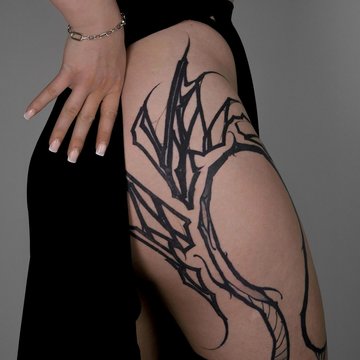


Psychological Risks for Tattoo Artists
- Stress from Insecurity. A lack of practical experience fosters constant anxiety, which directly affects the quality of work and decision-making during the tattooing process.
- Loss of Reputation. Unsatisfied clients spreading negative reviews can severely damage a tattoo artist's professional reputation and hinder their career growth.
- Professional Burnout. Insecurity about knowledge, fear of mistakes, and failures due to inadequate preparation can lead to emotional exhaustion and a sense of inadequacy in the profession.
- Erosion of Trust in the Industry. An increase in dissatisfied clients and a decline in trust toward the industry as a whole could reduce overall demand for tattoos.
- Financial Stress for Clients. Poor-quality tattoos often require expensive corrections, placing significant financial strain on clients and adding emotional pressure for the artist.
- Disappointment and Social Pressure Caused by the Artist. A subpar tattoo can lead to emotional discomfort, especially when the tattoo held personal significance for the client. An unattractive result may provoke judgment or unwanted questions from others, negatively affecting the client’s self-esteem and trust in the artist.
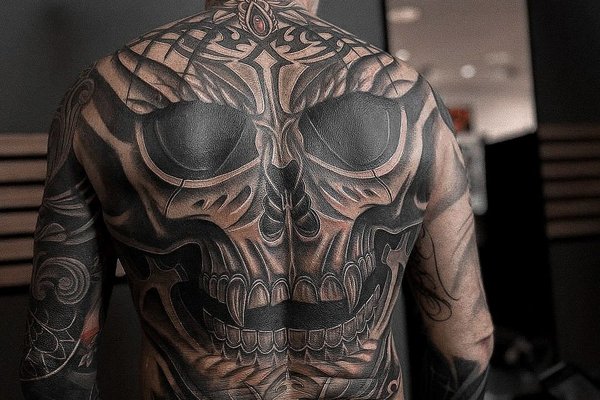
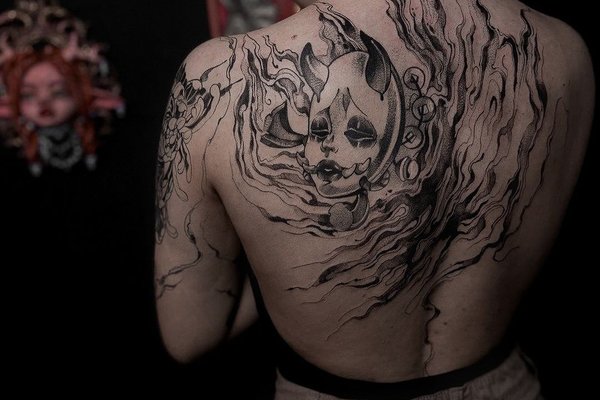
Advantages of In-Person Training at VEAN TATTOO Studios
Quality education is about responsibility.
A tattoo artist is a serious profession that requires proper practical training, as it affects not only income and aesthetic results but also the health of both the client and the artist.
- Access to professional equipment and materials: The academy provides a tattoo machine and all necessary consumables during training.
- Discount program: Offers opportunities to purchase equipment and materials on favorable terms, as well as discounts on workspace rental at any studio in the network.
- Theory based on practice: Courses are developed from years of international practical experience of thousands of network artists.
- Live practice: Training on real people provides an understanding of how to work with real skin, how the body reacts to pain, and what to do in unexpected situations.
- Mentorship: The key to professional development: A professional tattoo artist teaches the basics and shares their experience. A mentor is always available to correct techniques and answer questions.
- Safety and hygiene standards: Training includes techniques and specially developed high hygiene and sanitary standards to eliminate health risks.
- Practical psychology: Gaining real experience communicating with clients, something no online course can offer.
- Studio atmosphere: Working in a team with experienced artists motivates, inspires, and provides a better understanding of the profession.
- International diploma recognition and employment opportunities: Graduates receive an accredited diploma and the chance to start their own business or work in Europe. Those who excel during training and their diploma project defense may be offered employment in network studios. Overall, more than 90% of VEAN TATTOO Academy graduates start their careers immediately after completing the course.
VEAN TATTOO Academy courses cater to all levels, from beginners to active professionals looking to improve. A strong focus is placed on practice—starting with artificial skin and progressing to live models under close supervision of a professional artist.
Upon completion, graduates receive a diploma that can be easily verified, along with opportunities to work in Ukraine and Europe, including VEAN TATTOO studios. Choose VEAN TATTOO for your career development in the tattoo industry!
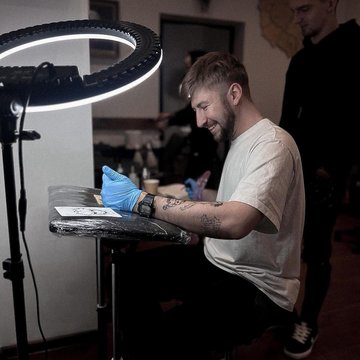
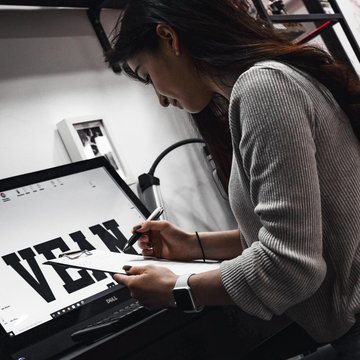
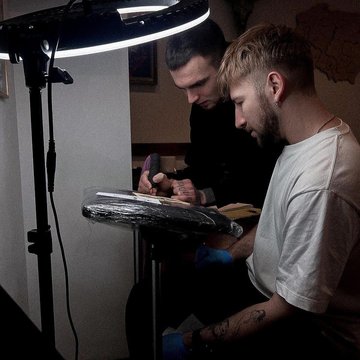


 Make a sketch in the AI VEAN TATTOO generator
Make a sketch in the AI VEAN TATTOO generator




